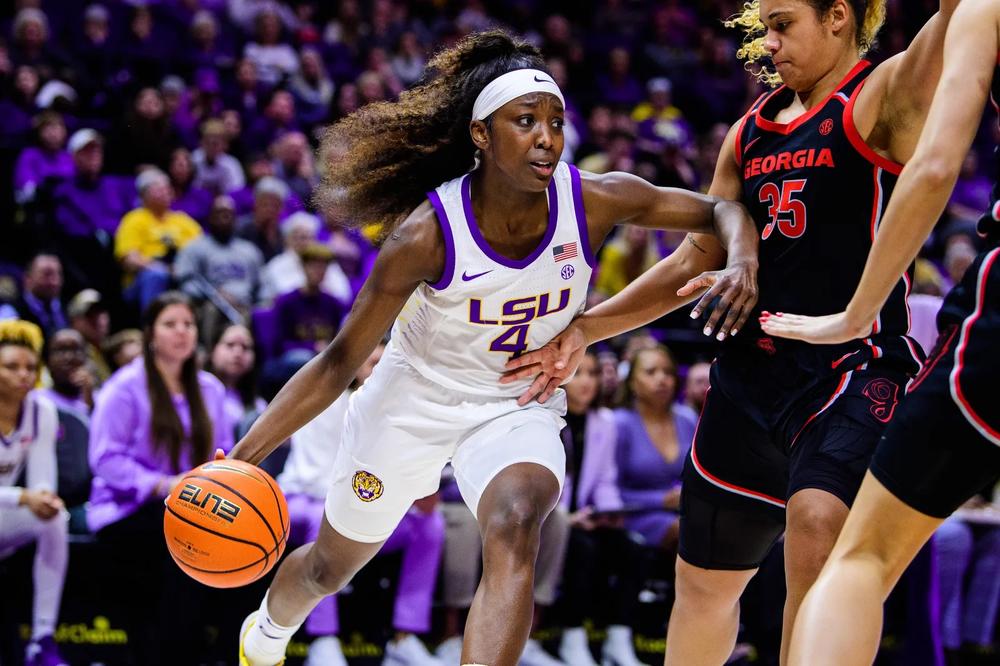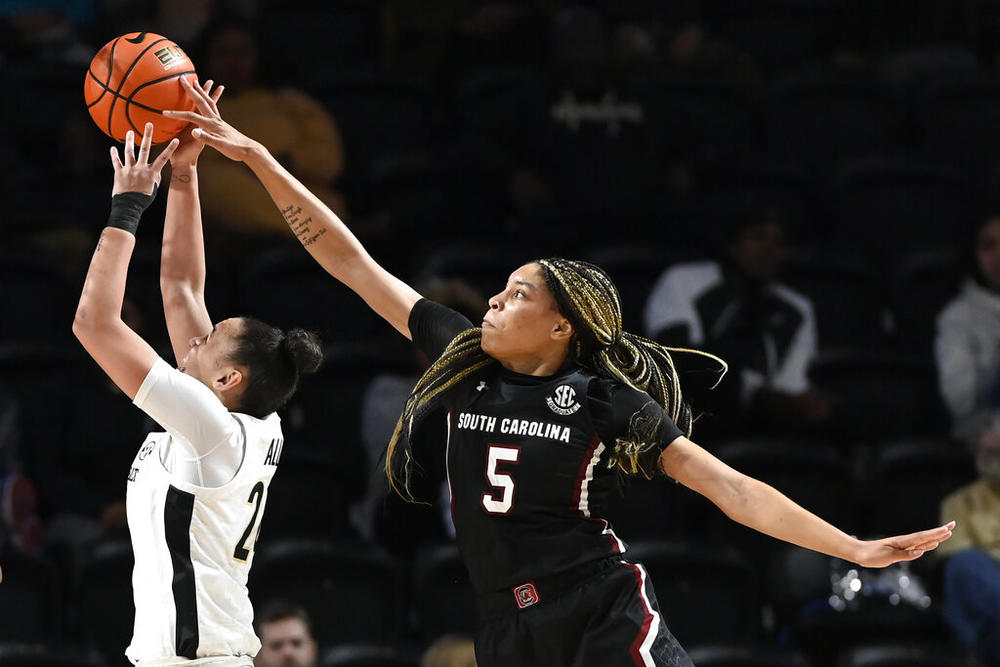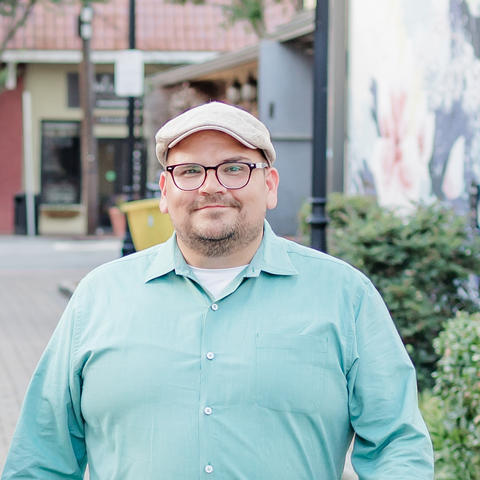
Section Branding
Header Content
Georgia Today: DNC not coming to Atlanta; Georgia's nursing shortage; Savannah's new honoree
Primary Content
On the Tuesday, April 11 edition of Georgia Today: the Democratic National Convention is not coming to Atlanta; what one Georgia hospital's doing to face a nursing shortage; and Savannah is honoring a women's basketball star.

Peter Biello: Welcome to the Georgia Today podcast from GPB News. Today is Tuesday, April 11. I'm Peter Biello. On today's episode, Atlanta will not be the host of the 2024 Democratic National Convention; a new program is looking to address the nursing shortage in Georgia, and a top women's college basketball player is being honored in her hometown of Savannah. These stories and more are coming up on this edition of Georgia Today.
Story 1
Peter Biello: The Democratic National Committee has chosen Chicago over Atlanta for its 2024 convention site. As GPB's Stephen Fowler reports, it's the second setback for Georgia Democrats seeking more national prominence in 2024.
Stephen Fowler: Chicago is a Democratic city in a Democratic state with a billionaire governor offering to foot the bill for the fall convention. Georgia Democrats pitched Atlanta as a convention-worthy city with an important civil rights history, a sizable nonwhite voter population and key swing state to win in 2024. The news comes as Georgia is likely to lose out on an earlier spot in the Democratic primary calendar, too. Even though the party approved an overhaul of early states, the Georgia secretary of state's office says Georgia will not hold two separate primaries, with the Republicans keeping their current calendar. For GPB News, I'm Stephen Fowler.
Story 2
Peter Biello: Gov. Brian Kemp announced today an auto parts manufacturer will create at least 180 new jobs in Southeast Georgia's Liberty County. Seohan Auto Georgia plans to invest more than $72 million in a new manufacturing facility. The South Korean company is a parts supplier for Hyundai. Hyundai officially broke ground last year on its $5.5 billion electric vehicle factory in neighboring Bryan County.

Story 3
Peter Biello: Nurses are the foundation of hospital care in Georgia. They are also increasingly in short supply to take up the slack. Many hospitals rely on expensive traveling nurses. A new program in Southwest Georgia is aimed at cutting those costs by encouraging student nurses to live and, one day, work where they're trained. GPB's Sofi Gratas reports.
Sofi Gratas: Away from the stressors of a real emergency room, a group of nurses at Phoebe Putney Memorial Hospital in Albany are huddled and prepping for their next patient, Mr. Sherman Yoder.
Unidentified Nurse: He's 80 years old. He's a Type 2 diabetic. He's normally healthy, alert and active until he developed a pressure ulcer on his great toe about five weeks ago.
Sofi Gratas: Mr. Yoder isn't a real person. He lives in Phoebe Putney Simulation Lab, a space where nurses can complete essential training with lifelike mannequins.
Unidentified Nurse: First and foremost, talk to your patient. He's going to talk to you, and you'll have some fun, OK?
Sofi Gratas: In the lab, preceptors watch and pretend to be the patient from behind a two-way mirror.
Unidentified Nurse: How is your pain today with your foot?
Simulated Patient: Oh, my toe's sore.
Sofi Gratas: Tracy Suber is the vice president of education at Phoebe Putney. She says the $5 million simulation lab is a long-term investment. By being able to train nursing students at the hospital, Phoebe hopes they're one step closer to recruiting them after graduation.
Tracy Suber: You know, we're starting to see the pipeline is there because we've built it.
Sofi Gratas: Although national workforce estimates point to a gradually closing gap between supply and demand of nurses, Georgia is expected to see a 21% shortage of registered nurses by 2035. This year, Phoebe broke ground on another investment in the hospital's workforce, a multimillion-dollar expansion to a local technical college. The building will have 80 apartments for nursing students from Albany Technical College. They'll live above a floor of classrooms, labs and offices right across the street from Phoebe Putney. Scott Steiner's office looks out over the worksite.
Scott Steiner: It's going to be three stories and then you'll have this common area, be some picnic tables and benches. Going to be a lot more activity than there is today.
Sofi Gratas: Steiner is the president of the Phoebe Putney Health System. As he puts it, the project is well worth the cost.
Scott Steiner: So this project is about $55 million. Last year we spent $100 million on contract nurses.
Sofi Gratas: About $225 an hour per nurse, he estimates. That's between four and five times more than the average hourly pay for a non-traveling registered nurse in Georgia. Steiner says health care has always struggled, but COVID-19 created even bigger gaps between supply and demand.
Scott Steiner: In order to do what we do, we — we have to contract for staff that doesn't live in our community. Most don't even live in the state of Georgia.
Sofi Gratas: Instead of 300 contract nurses...
Scott Steiner: We want 300 nurses that live in our community, go to our churches, shop at our stores, buy houses, raise families.
Sofi Gratas: Lisa Stephens is the dean of the nursing program at Albany Tech. She says close to 90% of the students she enrolls end up working at Phoebe. But her aim is to grow the program to 200 graduates annually, 10 times as many compared to some years. And she has a good idea of the challenges in the way.
Lisa Stephens: When we really look at why we aren't able to attract as many from the more rural areas of our service delivery area, transportation tends to be one.
Sofi Gratas: She expects students living maybe 40 or 50 miles away will be more likely to enroll at the college if they can live and study in the same place. And maybe one day, they can get a job there too.
Lisa Stephens: It's right across the street. I can't stress that enough.
Sofi Gratas: Traci Suber at Phoebe Putney says something like what they're calling the living and learning community would have been really helpful when she first started in health care.
Tracy Suber: I was 20 when I started. I lived at home. I didn't have access to all these resources. And good grief, I would have really appreciated it.
Sofi Gratas: It's the kind of support Suber and others hope will keep newly trained nurses in Southwest Georgia. The new housing project is slated to open in 2024. For GPB News, I'm Sofi Gratas.
Story 4
Peter Biello: The United Campus Workers of Georgia at Georgia Gwinnett College in Lawrenceville, northeast of Atlanta, demonstrated today to demand more money for the state's colleges and more faculty at GGC. The demonstration came as the school broke ground on its new Convocation Center. Jill Penn is co-president of United Campus Workers of Georgia and an associate professor of biology.
Jill Penn: If we have that little bit of extra money for this building, we shouldn't be spending it on that. We should be focusing on our students and having reasonable workloads so that we can teach these students.
Peter Biello: A spokesperson for Georgia Gwinnett College says the Convocation Center is built with mostly state funds and some private donations.

Story 5
Peter Biello: Georgia State University students, both inside and outside of prison, will soon begin working on a new literary journal featuring the work of incarcerated people. GPB's Grant Blankenship has more.
Grant Blankenship: Beyond Bars will be edited by a team of seven: four Ph.D.-level creative writing students and three students in Georgia State University's prison education program at Phillips State Prison. GSU professor and poet Beth Gillis will lead the team. She says she hopes to make it easy to submit work like poetry, fiction, rap lyrics and visual art to the journal.
Beth Gillis: We're going to accept mail-in submissions. We're going to accept handwritten submissions, which most journals are just not equipped to do. So it's, you know, we're hoping that that's going to sort of open some doors for people who wouldn't normally have those doors open for them.
Grant Blankenship: Beyond Bars will be printed and then distributed to prisons, libraries, bookstores and subscribers starting January of 2024. For GPB News, I'm Grant Blankenship in Macon.
Story 6
Peter Biello: Among the Guggenheim Fellows announced this week are four based in Georgia. The prestigious fellowship gives artists, writers and scholars a cash award to support their work. Georgia Fellows are Sonia Hirt, Hughes Professor in Landscape Architecture and Planning at the University of Georgia. Andrew Herod, human geographer and political economist at the University of Georgia. And visual artists Jiha Moon of Doraville and Erin Jane Nelson of Stone Mountain. Nelson says in the art world, it's really difficult to know when you've moved from emerging to mid-career stage.
Erin Jane Nelson: And so for me, this feels like a really good confirmation that I've achieved a new level of stability, I've noticed.
Peter Biello: This year's 171 fellows were selected from almost 2,500 applicants.

Story 7
Peter Biello: An intersection in Savannah will be renamed after a top women's college basketball player who hails from the city. GPB's Benjamin Payne reports.
Benjamin Payne: Louisiana State University guard Flau'jae Johnson will be honored later this year in her hometown of Savannah. She helped lead LSU to its first NCAA tournament championship earlier this month, beating the University of Iowa 102 to 85.
Announcer: Flau'jae Johnson lays it in, plus the foul, on Caitlin Clark!
Benjamin Payne: Johnson was voted this past season as the top freshman in the Southeastern Conference. She's also a prolific rapper, rising to prominence on the TV show America's Got Talent before her college basketball career began. Some of Johnson's songs call for an end to gun violence, an issue especially personal to her as her father, also a rapper, was murdered before she was born. For GPB News, I'm Benjamin Payne in Savannah.

Story 8
Peter Biello: The Atlanta Dream added three players to its roster last night in the WNBA draft. With the sixth overall pick. The Dream selected Haley Jones from Stanford. Jones was the 2021 Final Four Most Outstanding Player, and with the eighth overall pick, the team added South Carolina forward Laeticia Amihere. In the second round, the Dream picked Leigha Brown, a guard from the University of Michigan. Also in the WNBA draft, South Carolina forward Victaria Saxton, who is from Rome, Ga., went to the Indiana Fever in the third round.
Story 9
Peter Biello: When wild pigs are relocated, where do they go and how far do they travel? These are the questions researchers at the University of Georgia sought to answer in their new study published last month in the journal Scientific Reports. Wild pigs are often illegally relocated for hunting. They could damage crops and carry diseases. To conduct the study, researchers fitted some wild pigs with GPS collars and move them several miles away, then tracked where they roamed. They found that the pigs moved for miles in a short amount of time and often found each other and formed social groups. Most pigs did not return to where they were initially picked up by researchers. The study's authors say the information gathered is helpful for developing a response to new introductions of pig populations.
And that is a wrap on today's edition of Georgia Today. We do appreciate you tuning in. Be sure to tune in tomorrow; subscribe to this podcast, and we will be right there waiting for you in your podcast feed tomorrow afternoon. If you've got feedback for us, please do send it our way. The email address is GeorgiaToday@GPB.org. And if you like this podcast, leave a review because that will help other folks find us. I'm Peter Biello. Thank you again for listening. We'll see you tomorrow.
___
GPB's Georgia Today newsletter hits your inbox on Tuesdays, Wednesdays and Thursdays with top stories from around the state featuring news, politics and more. Subscribe here.



